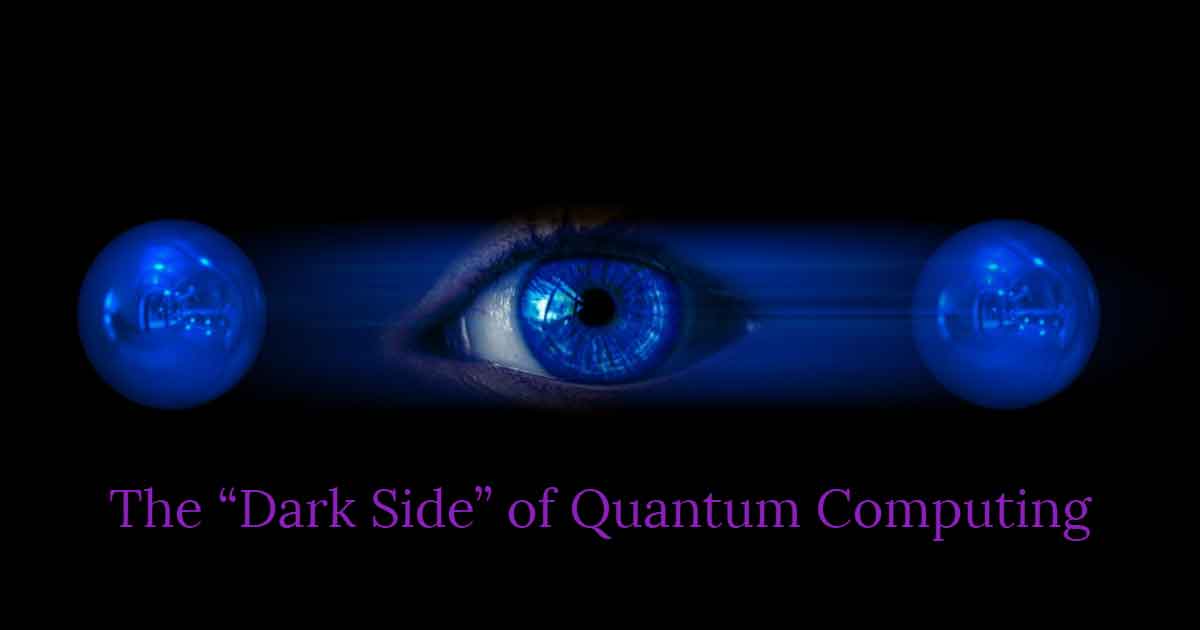For several years running, quantum computing has remained a hot topic in the computer industry. Both interest and hype continue to build for this technology, thanks to its potential to revolutionize our world with the speed and raw computational power it promises. However, for many quantum computing is not deeply understood due to the seemingly arcane and unusual theoretical concepts that underlie it.
Moreover, quantum computing has more recently begun to attract attention for its potential “dark side”, bringing concerns that were previously unanticipated by quantum computing into the limelight. In this post, we take a closer look at both the basic physics behind the technology and its potential threats to see whether these issues are worthy of our concern.
What is Quantum Computing?
In highly simplified terms, quantum computing leverages the instability of tiny particles called quantum bits or “qubits” to function as the on/off gates like those in traditional, so-called “classical” or “binary” computers. The key difference here is that qubits have a distinctive capability to hold multiple physical states or values simultaneously, and through this property they enable quantum computers to perform at speeds much faster than the binary computers we now use. Prototypes and small-scale quantum computers are now in use in limited test and real-world applications, and the technology is indeed promising and revolutionary.
Because the explanation above was quite abbreviated, we suggest this mini-site from IBM for great background for those who are not familiar with the basics of quantum computing and want to learn more: https://www.research.ibm.com/ibm-q/learn/what-is-quantum-computing/.
Computer Security Issues Related to Quantum Computing
As we reviewed some of the latest news and discussion around the potential benefits and applications of quantum computing, we noticed how some issues have recently begun to surface. It appears that some computer security experts and industry publications are voicing concerns about the ways in which quantum computing could threaten the status quo of computer security and digital cryptography techniques in use around the world to safeguard critical data. Are you curious to find out how and why? Read on to learn more!
How are current computer security methods at risk from quantum computing?
A recent article in Nature Magazine summed the potential security threat that quantum computers could pose to the current state of digital cryptology in this way:
“Quantum computers exploit physical effects, such as superpositions of states and entanglement, to perform computational tasks. They are currently much less powerful than conventional computers, but will soon be able to outperform them on certain tasks. One such example is breaking security protocols that are based on cryptographic algorithms, as mathematician Peter Shor pointed out in 1994. A blockchain is particularly at risk from this because one-way functions are its sole line of defence — a user’s only protection is their digital signature, whereas bank clients are protected by plastic cards, security questions, identity checks and human cashiers.”
But blockchain is touted for its strong security, so what’s the issue?
As mentioned in the quote above, although it is rightly considered a secure solution for many types of transactional activities conducted by binary computers, blockchain could in fact be at grave risk of compromise or exploitation from quantum computing. Why? This is because the strength of blockchain lies in the way that classical computers use binary digits to denote one-way, on/off states, making it a challenge to perform the massive calculations needed to decipher bitcoin security.
In contrast, since quantum computers utilize qubits that can represent multiple values at the same time, they are theoretically very strong at these sorts of large calculations. As such, it follows that they could also crack bitcoin security with relative ease compared to their classical counterparts thanks to this capability.
How grave is this potential threat?
According to TechnologyReview.com, experts say reliable and secure “quantum-resistant cryptography” could be more than 20 years away from us. Fortunately, foresighted organizations and agencies like NIST are already hard at work to define standards for quantum-resistant computing, which will be critical to protect the ever-increasing number of network-connected devices that must be kept secure – from financial institutions to automobiles to garage door openers to industrial networks.
For additional reading, both on the basics of quantum computing and more detail on potential security threats from this promising technology, we suggest the following:
- Technology Review: https://www.technologyreview.com/s/612509/quantum-computers-encryption-threat/
- University of Waterloo: https://uwaterloo.ca/institute-for-quantum-computing/quantum-computing-101
- Nature Magazine: https://www.nature.com/articles/d41586-018-07449-z
- Blockchain Council: https://www.blockchain-council.org/blockchain/is-quantum-computing-an-existential-threat-to-blockchain-tech/
- CNET: https://www.cnet.com/news/ibms-quantum-computing-ambitions-get-exponential-like-moores-law/
Thanks for reading this Tech Blog! What are your thoughts on quantum computing and the potential risks to computer security? Do you think that advances in security can evolve in time to meet the threat that quantum computing may present? Drop us a line in the comments below – and let us know what topics you’d like to see in future posts!






